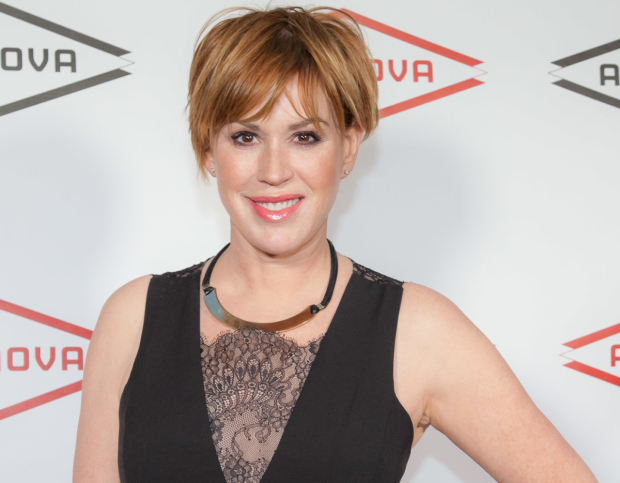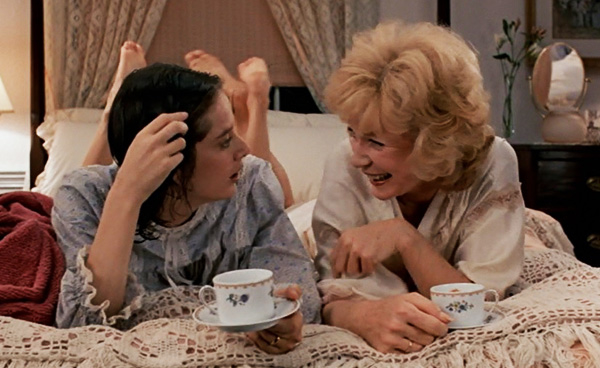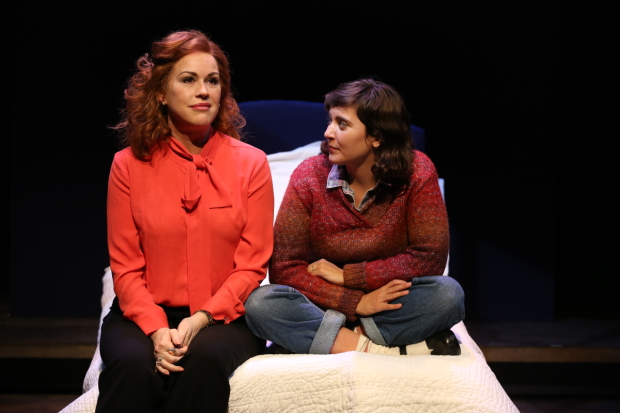Molly Ringwald Gets "Grandmothered" Into Her Next Great Role in Terms of Endearment
In 1983, Larry McMurtry's novel Terms of Endearment was transformed into an Oscar-winning film, directed and penned by James L. Brooks. Spanning 30 years, the story zeros in on the evolving relationship between Emma Greenway and her melodramatic mother, Aurora. Widowed young, Aurora builds a close yet codependent relationship with her daughter, whom she criticizes and cajoles through a flawed marriage and three children. Shirley MacLaine originated the role of Aurora to Oscar-winning acclaim, and now Molly Ringwald takes on the role in the American premiere of Dan Gordon's stage adaptation, currently running at 59E59 Theaters.
"I initially was a little taken aback," said Ringwald about being offered the part. "I'm the mother of one teenager and two seven-year-olds, so I don't really see myself in a grandmother position yet." Fortunately, neither does Aurora (as the show's producers reminded her) — nor do audiences, who still see Ringwald as the young star of John Hughes' 1980s coming-of-age films Pretty in Pink, The Breakfast Club, and Sixteen Candles. But as someone who's moved on to a diverse career in film, theater, and music, she's eager to take on her next challenge — even if it means re-creating a role that, in her opinion, has already been given a perfect-ten performance.

(© Seth Walters)
Did you join the cast of Terms of Endearment as a fan of the movie?
Yeah, I had seen the movie a number of times as a teenager. I thought that both [Shirley MacLaine's and Debra Winger's] performances were extraordinary, and I found it very inspiring to watch as a young actress. So I was very familiar with the film, and then when I began to work on this, I made the choice not to go back and watch it again. I thought, "I need to find my own way into the character." Otherwise it would be hard not to make the choices that [MacLaine] made. I want my Aurora to be different. And Shirley, actually — although she was so fantastic in the role — she was different than Aurora was originally written. She made it her own, and so I'm making it my own and taking elements out of the book and putting them back in.
How is Aurora depicted in the book?
She's described as very voluptuous. She's very proud of her hair, she's very into her appearance. I would say she's even more narcissistic in the book than she is in the movie, and I would say even more eccentric. She's a little bit of a seductress, and that element is not in the movie. I really took that from the book. I've been trying to find my own spin on her. And the more I do it, the more I get into that. It's like listening to an Ella Fitzgerald recording. You want to do all the same phrasing because she's fantastic. And then eventually the more you sing it the more it becomes your own.
You had a similar task when you made your Broadway debut as Sally Bowles in Cabaret, which has been given so many iconic performances. Do you enjoy the challenge of re-creating roles that have already been given definitive interpretations?
It's not something I necessarily seek. I think I'm open to doing a role if there's something that I can bring to it. Terms of Endearment hasn't been seen onstage, so I felt like it was an opportunity to create something new and different. And Sally Bowles is just such a fantastic role, and I feel like there are so many ways you can play that role — even though Liza Minnelli nailed it. But there are different interpretations you can bring to it. I would love to create my own roles from scratch, and I've gotten to do that a couple of times. But it doesn't make that much of a difference to me. It's really about what the role is and whether or not I can bring something to it.
You mentioned the grandmother side of Aurora felt foreign to you, but does being a mother yourself help you play the mother-daughter relationship between Aurora and Emma?
I think it's something that is very much inside of me and very easy to access because it's something that I deal with every day. But that said, I don't believe that you have to be a mother in order to play a mother. If I play a heroin addict, I don't think I'm gonna go and shoot heroin. It's definitely something that you can do without having experienced that's firsthand.

How have you built that mother-daughter bond with your costar Hannah Dunne?
We really had an immediate connection. There's something about looking at her face that's very familiar to me. I tell her that she has big eyes like my daughter. I also really love her voice and her strength. I feel like Aurora is such a strong personality — it really requires somebody that has that fire to stand up to.
What is it that bonds the two of them so strongly, even with, as you said, Aurora being so self-centered?
I think there's a lot of love there that I hope comes out. And Emma's also just a very kind person. She has an inherent wisdom that nobody else in the play really has. And I think she loves her mother and can see through all of her mother's histrionics. I also feel like Aurora — she's definitely flawed, she's definitely narcissistic, she's selfish, she's all of that. But she really loves her daughter. And she's also raised her daughter as a single mother, so they've kind of faced the world together.
Why do you think Terms of Endearment is a story that moves so many people?
I think everybody has that person in their life that they're always searching for the right amount of distance [from]. That person that maybe you're just a little bit codependent or they drive you crazy. You can't live with them, you can't live without them — whether it's a mother, a sibling, a lover, or a friend. And it's also about loss and grieving and letting go. It deals with these very strong primal human emotions. It's about love.

(© Carol Rosegg)











